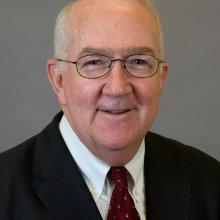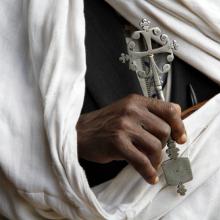ambassador
Pope Francis has been hailed for his forward thinking, but — at least according to French news reports — the pontiff has put on the brakes when it comes to a gay French ambassador at the Vatican.
In January, French President Francois Hollande nominated his protocol chief Laurent Stefanini as Vatican envoy to replace outgoing ambassador Bruno Joubert. The pick seemed ideal: 55-year-old Stefanini is described as brilliant and a devout Roman Catholic, who secured support for his candidacy from Cardinal Andre Vingt-Trois, the archbishop of Paris. He is also a known quantity at the Vatican, having served as first councillor to the Holy See a decade ago.
But so far, his nomination has gone nowhere. On April 22, France’s investigative weekly “Le Canard Enchaine” reported Pope Francis met with Stefanini last weekend. The message: The pontiff did not appreciate France’s 2013 same-sex marriage law, nor being pressured into accepting Stefanini’s candidacy.
French media report the standoff is due to Stefanini’s sexual orientation; France’s foreign ministry has only said his private life should be respected.
The Senate has confirmed Rabbi David Saperstein as the State Department’s ambassador-at-large for international religious freedom, making him the first non-Christian to hold the job.
Saperstein, who led the Reform Jewish movement’s Washington office for 40 years, focusing on social justice and religious freedom issues, was nominated by President Obama in July and confirmed by a 62-35 vote on Dec. 12.
Saperstein takes a liberal bent on domestic issues, and all but one of the votes against him came from a Republican.
“Religious freedom faces daunting and alarming challenges worldwide,” Saperstein said at his confirmation hearing in September. “If confirmed, I will do everything within my abilities and influence to engage every sector of the State Department and the rest of the U.S. government to integrate religious freedom into our nation’s statecraft and foreign policies.”
Saperstein, named the most influential rabbi in America by Newsweek magazine in 2009, will head the State Department’s Office of International Religious Freedom, where he will be tasked with monitoring religious freedom abuses around the world.
President Obama on Monday said he plans to tap Rabbi David Saperstein as the next ambassador-at-large for international religious freedom, the first non-Christian to hold the job, which was created in 1998.
As ambassador, the man named as the most influential rabbi in America by Newsweek magazine in 2009, will head the State Department’s Office of International Religious Freedom, and will be tasked with monitoring religious freedom abuses around the world.
“When it comes to the work of protecting religious freedom, it is safe to say that David Saperstein represents the gold standard,” said Secretary of State John Kerry, announcing the nomination at the State Department.
A Reform rabbi and lawyer, Saperstein, 66, has led the Religious Action Center of Reform Judaism for 40 years, and has spent his career in Washington, focusing on social justice and religious freedom issues. He was instrumental in the 1993 passage of the Religious Freedom Restoration Act, which requires the government to show a compelling reason for any action that impinges upon the exercise of religion.
Barack Obama’s critics allege that the president doesn’t practice what he preaches on international religious freedom policy. Last week they pounced on an apparent gap between presidential rhetoric and reality.
On Thursday, the same day that Obama issued his annual Religious Freedom Day proclamation, Religion News Service published an article highlighting his administration’s failure to quickly nominate a new ambassador at large for religious freedom.
Suzan Johnson Cook resigned in October and a successor has yet to be named. It took the administration well over a year to nominate Johnson Cook in the first place, and then a skeptical Senate took an additional year to confirm her. During her brief tenure Johnson Cook never escaped criticism that she was unqualified for the job.
Even so, Obama used his proclamation to affirm, “America proudly stands with people of every nation who seek to think, believe, and practice their faiths as they choose.” He promised that his administration “will remain committed to promoting religious freedom.”
The U.S. Senate has confirmed former Catholic Relief Services head Ken Hackett to be the next ambassador to the Vatican.
Hackett replaces Miguel Diaz, a theologian, and he gives President Obama an experienced voice on social justice in Rome where a new pope, Francis, has made caring for the poor a priority.
Hackett’s confirmation came Thursday night by unanimous consent as senators wrapped up loose ends before the summer recess.
No opposition was expected since Hackett has strong ties to both parties; for five years he served on the board of former President George W. Bush’s Millennium Challenge Corporation and he is reported to be close to Denis McDonough, Obama’s chief of staff, whose brother is a priest.
President Obama on Friday nominated Ken Hackett, former head of Catholic Relief Services, to be the next U.S. ambassador to the Vatican.
It’s a savvy move, picking a Catholic whose career in the church has been dedicated to alleviating suffering as America’s representative to a pope who has made helping the poor a priority for his pontificate.
Hackett replaces Miguel Diaz, who left the post last November to teach at the University of Dayton. Diaz is a theologian, which was a first for the U.S. ambassador to the Holy See, and that also seemed to make sense in that Pope Benedict XVI, whose retirement led to the election of Pope Francis last March, is a renowned theologian.
WHEN AMBASSADOR Chris Stevens was killed in Benghazi, Libya, in September, it was jarring for me to hear NPR refer to the last U.S. ambassador to be slain: my father, Adolph Dubs. He was kidnapped in 1979 in Kabul, Afghanistan, by Afghan extremists whose motives were never learned, and killed hours later in a botched armed response by the Soviet-allied Afghan government, even as U.S. diplomats pleaded for more time to negotiate.
My dad was 58, a career diplomat. After serving in the Navy during World War II, he had entered the foreign service, compelled by a deep desire to learn to use diplomacy to blunt the forces of fear and hate at the root of violent conflict. As a young man, he had considered the Lutheran ministry; he saw his work as a diplomat as a pragmatic way to build relationships, even with those whose histories and beliefs seemed alien to our own. People sensed this about him. Whether meeting with the Soviets at the height of the Cold War, with Serbian farmers in the former Yugoslavia, or, finally, with Afghans in the uncertain and perilous months before the Soviet invasion, he was universally respected for his integrity and commitment, and even loved for his genuine humanity and humor.
Among the many expressions of sympathy I received following his death, one photo is particularly meaningful. It's not the one depicting U.S. Secretary of State Cyrus Vance and other dignitaries receiving my father's casket at Andrews Air Force Base—rather, it's an image (above) taken in the courtyard of the embassy in Kabul. It shows the Afghan men who knew him, who had lived and worked around him during his time there. They are grouped around a memorial they had made, with his picture propped on it. These are the people who considered him a friend, understood what he was about in their country, and felt his loss, deeply and personally.
Coptic Christian leaders in the United States distanced themselves from an anti-Muslim film that has sparked protests in more than 24 countries, and denounced the Copts who reportedly produced and promoted the film.
"We reject any allegation that the Coptic Orthodox community has contributed to the production of this film," the Coptic Orthodox Archdiocese of America said in statement on Friday.
"Indeed, the producers of this film have taken these unwise and offensive actions independently and should be held responsible for their own actions."








